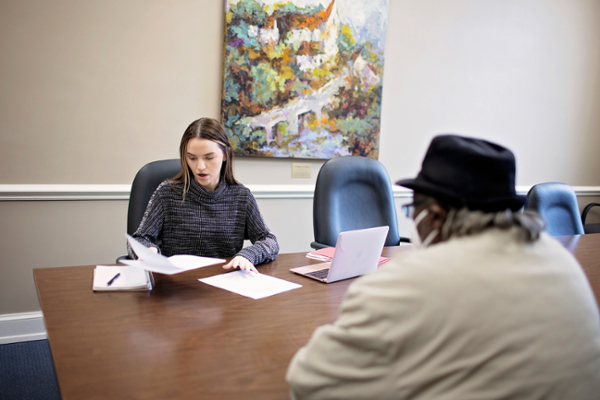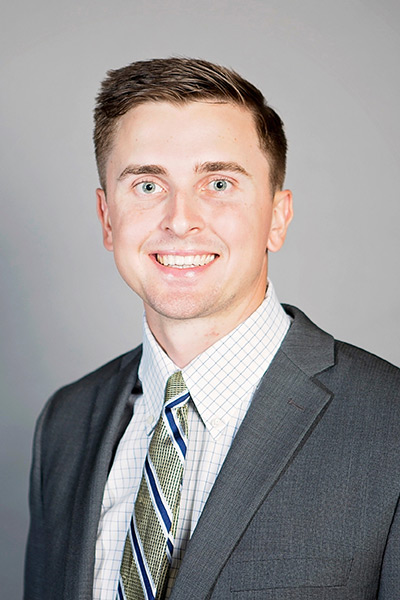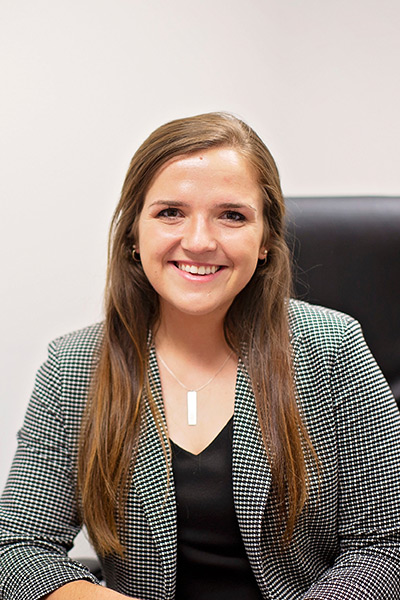Published on May 27, 2022 by Nancy Dorman-Hickson

Taylor Payne advises a C-VETS client
Samford University’s Cumberland School of Law clinic students have provided valuable support to real clients on legal matters for the past two years. In 2021-2022, some 48 of the 444 students enrolled in Cumberland’s juris doctorate program assisted in nearly 150 cases through Cumberland’s four law clinics, the last two of which began in spring 2022. The clinics embody Cumberland’s mission of training students to serve their communities, professionally and ethically.
By providing free assistance to military veterans, persons accused of crimes, and persons claiming innocence, students gain legal experience. They learn how to conduct client interviews and investigations, prepare legal documents, and gain skills in case evaluation and time management.
Cumberland Veterans Legal Assistance Clinic (C-VETS)
The Cumberland Veterans Legal Assistance Clinic (C-VETS) was one of two clinics first established in 2020, despite COVID-19 restrictions. Offering assistance to servicemembers, military veterans and their families, C-VETS has grown in scope from an initial eight-county region to covering the entire state of Alabama. This past year, 15 students participated in C-VETS, and worked on several expungements for veterans, particularly those who completed a Veterans Treatment Court program. Expungement and all of the services offered give students opportunities to learn about legal realities faced by veterans, including finding affordable counsel.
Judge John Carroll ’74 and attorney Wilson Myers, both military veterans, supervised the students. In addition to restoration of voting rights and pardon issues, students aid in such legal issues as consumer debt, landlord-tenant matters, uncontested family law concerns, wills and estates, and the previously mentioned expungements.

“The lessons I've learned from a personal standpoint are endless,” said Will Green'22, a spring 2022 C-VETS student advocate. “Maybe the most noteworthy lesson is that serving others in need requires mental strength in areas such as patience, grace, and understanding–all of which extend beyond a mere understanding of the law.”
Discharge upgrades is another issue affecting servicemembers, with successful legal intervention leading to eligibility for health care and disability benefits. Before the military and legal system fully appreciated the effects of post-traumatic stress disorder, mental health conditions, and trauma, servicemembers who were thought to have these circumstances were discharged as “undesirable” or under conditions “other than honorable.” The military’s increased recognition of how certain conditions may have contributed to situations that led to a veteran’s separation from the military led to new opportunities to apply for discharge upgrades with the appropriate branch’s Discharge Review Board.
“It is very rewarding to see a case move from the first phone call to do intake, all the way to a judgment, one that is hopefully favorable for them,” said Taylor Payne '22, a spring 2022 C-VETS student advocate. “This provides a strong rapport between the attorney—or student—and the client, and I believe it gives the client a sense of comfort knowing that someone is looking into their issue and communicating with them directly from start to finish.”
Cumberland Innocence Clinic (CIC)
Students within the Cumberland Innocence Clinic (CIC), which began in fall 2020, evaluate and investigate claims of innocence by Alabama prisoners. The need is great: Alabama has potentially between 1,110 to 1,670 innocent people currently incarcerated, with the fifth-highest prison population per capita in the country. Cumberland School of Law Professor and Director of Clinics LaJuana Davis and Adjunct Professor Leslie Coyne ’91 supervise CIC students’ work on Alabama postconviction cases.
During the 2021-2022 academic year, some 15 CIC students reviewed requests from ten Alabama counties, working on fact investigation, claim assessment, preparation of requests for evidence, and working with volunteer counsel. Students used investigative skills to assess innocence and used persuasive writing and speaking skills to craft and present arguments to advance theories of innocence or recommendations for case closure.

“I am very thankful for the opportunity to have participated in this clinic,” said Morgan Grissett, a fall 2021 CIC student. “I gained a good bit of practical experience, but more than that, it opened my eyes further to the struggles faced by those made subject to the criminal judicial process. I am always grateful for a shift of perspective and, if I took nothing else away, it would be a new look on life and particularly the criminal justice system.”
Capital Defense and Criminal Appeals Clinics
Cumberland’s newest clinics—the Capital Defense Clinic and the Criminal Appeals Clinic—were added in spring 2022, both hosted by the Jefferson County Public Defender’s Office. A total of 11 students participated, five in the Capital Defense Clinic and six in the Criminal Appeals Clinic.
This past spring, Capital Defense Clinic students helped in the early investigation of a capital case and assisted in the preparation for and trial of a second capital case. “The students got to see all the work that goes into investigating a capital case and the finished product in the form of a trial,” said clinic supervisor Sammie Shaw, the Jefferson County Deputy Public Defender and a Cumberland adjunct professor. Capital Defense Clinic students worked on litigation tasks, ranging from fact investigation to trial preparation.
Alisha McKay, the defender’s appellate attorney for Jefferson County and a Cumberland adjunct professor, supervises the Criminal Appeals Clinic. “Students took part in client meetings, which allowed them to walk our clients through the appellate issues we had identified in their cases,” she said. Students in this clinic faced several challenging issues, working on post-trial motions and appeals from Jefferson County criminal convictions, including sentence credit, ineffective assistance of trial counsel, the habitual felony offender act, jury instructions and hearsay.
Funding for the bulk of the four clinics comes from sources external to the law school. Major funders include Stephen B. Moss ’68; the Veterans Consortium Pro Bono Program in Washington, D.C.; the Alabama Law Foundation and its executive director, Dawn Hathcock; and cooperating agencies who have given in-kind assistance and supervision, including the Jefferson County Public Defender’s Office and Volunteer Lawyers Birmingham.
Located in the Homewood suburb of Birmingham, Alabama, Samford is a leading Christian university offering undergraduate programs grounded in the liberal arts with an array of nationally recognized graduate and professional schools. Founded in 1841, Samford enrolls 6,324 students from 44 states, Puerto Rico and 16 countries in its 10 academic schools: arts, arts and sciences, business, divinity, education, health professions, law, nursing, pharmacy and public health. Samford is widely recognized as having one of the most beautiful campuses in America, featuring rolling hills, meticulously maintained grounds and Georgian-Colonial architecture. Samford fields 17 athletic teams that compete in the tradition-rich Southern Conference and boasts one of the highest scores in the nation for its 97% Graduation Success Rate among all NCAA Division I schools.
